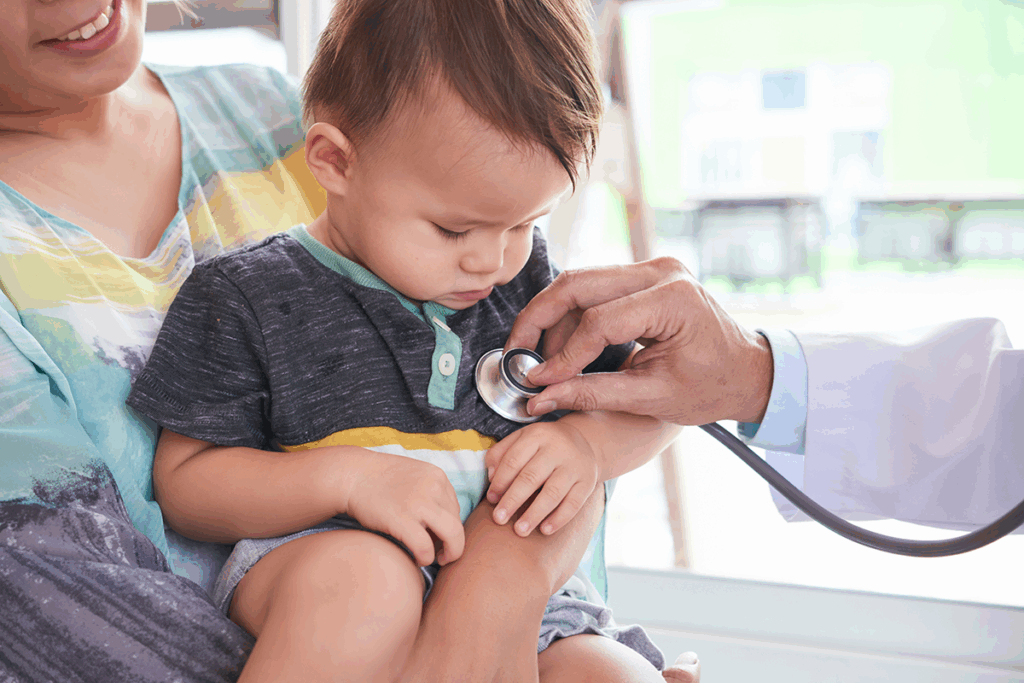Last Updated on November 24, 2025 by

Your baby’s first pediatric appointment is a big deal. It happens 3-5 days after birth. At this time, doctors check how your baby is adjusting to life outside the womb. We know you might have lots of questions and worries about your baby’s health.
At this visit, pediatricians look over your baby’s birth and family health history. They do a physical check-up and track growth. This first check is to see how your baby is doing, fix any quick issues, and help new parents. Heading to your child’s first pediatrician appointment? Understand what do pediatricians do and what to expect during the visit.
Knowing when and why your baby’s first doctor’s visit is key for new parents. The American Academy of Pediatrics says newborns should see a doctor within the first week. This is usually between 3 to 5 days after birth.
This first visit is very important. It lets doctors check your baby’s health, look for any problems, and talk about your concerns. Nearly 99% of US newborns attend this visit, showing how critical it is for their health.
The first doctor’s appointment is usually within 3 to 5 days after birth. This is important because it’s when babies get their first Hepatitis B (HBV) vaccine. This vaccine is given within the first 24 hours of life.
At this visit, doctors also check the results of two important tests your baby had in the hospital. These tests are for hearing and blood. They help find health problems early, so they can be treated quickly if needed.

The first doctor visit is more than just a routine check-up. It’s a detailed check of your baby’s health. Doctors look for early health problems, check how your baby is feeding and if they have jaundice. They also give advice on safe sleep, nutrition, and other important care tips for newborns.
This visit is also a chance for new parents to ask questions and get reassurance. By going to this visit, parents can learn more about their baby’s needs. They can feel more confident in caring for their baby.
To make your baby’s first doctor’s visit smooth, prepare well. You’ll need the right info and items. This helps you enjoy the visit and reduces stress.
Before you go, collect all important documents. This includes hospital paperwork and your baby’s birth weight. Also, bring any pregnancy or birth complications, and vaccination records.
Having your baby’s medical history ready is key. It lets the pediatrician understand your baby’s health. This helps them give better care.
Also, bring info on your baby’s feeding. If you’re breastfeeding or using formula, share this. The pediatrician needs this to check if your baby is getting enough to eat.

Write down questions before the visit. Think about your baby’s health, feeding, and sleep. This way, you won’t forget to ask important things.
Ask about safe sleep practices, feeding schedules, and spotting illness in newborns. The pediatrician can give you personalized advice.
Know what to bring for a comfortable visit. Pack diapers, wipes, and an extra outfit for your baby. Don’t forget any other supplies you might need.
Bring a pacifier or a comfort item. It can calm your baby if they get upset.
For more tips on your baby’s first visit, check out The Essential Guide. It offers more insights and prepares you better.
At the first pediatric appointment, doctors do a detailed check to spot any health issues early. This first visit is key for your baby’s health and growth.
We start by looking at your baby’s birth and family health history. This helps us find out if there are any genetic or birth defects. It’s important to bring any medical records to this appointment for a full picture.
We talk about many things, like:
A detailed physical check is a big part of the first visit. Our pediatricians are skilled at doing these checks gently and quickly, making sure your baby is comfortable.
The check includes looking at:
Tracking your baby’s growth is a big part of the first visit. We measure your baby’s weight, length, and head size. These measurements help us see how your baby is growing.
Accurate growth measurements are key for checking your baby’s health and growth. We compare these to growth charts to make sure your baby is growing right.
At the first pediatric visit, doctors check newborns for common health issues. These can affect their health and growth. We tackle these problems early to help new parents.
About 60% of newborns have jaundice. We screen for it during the first visit. Jaundice screening is a simple check-up and might include a blood test. If jaundice is found, we guide on how to manage it to avoid problems.
Feeding is key for a newborn’s health. We check how your baby eats and offer nutritional guidance. This ensures they get enough food for growth. We also help with any feeding problems.
The first visit is a chance to spot health problems early. We do a full check-up and look at your baby’s medical history. This helps us catch conditions that need more attention.
By tackling these issues early, we give new parents confidence. They know how to care for their baby’s health.
As you prepare to care for your newborn, your pediatrician will offer valuable support. Caring for a new baby can feel overwhelming. We’re here to guide you through this journey.
Safe sleep practices are key to preventing Sudden Infant Death Syndrome (SIDS). The American Academy of Pediatrics suggests your baby sleep on their back in a firm crib. This crib should be free from soft bedding and toys. Following these guidelines can greatly reduce SIDS risk.
Key safe sleep practices include:
Nutrition is vital for newborn care. We offer guidance on breastfeeding support and solid food introduction. Finding a feeding schedule that works for you and your baby is important. We’ll help with any breastfeeding or formula-feeding challenges.
Nutritional tips for new parents:
Keeping your home safe for your newborn is a top priority. We provide tips on home safety essentials. This includes installing safety gates at stairs and securing furniture and appliances. These precautions help create a safe environment for your baby’s growth and development.
Home safety tips:
After the first pediatric visit, we set up a follow-up schedule. This is to track your baby’s growth and development. It includes scheduled immunizations and addressing any concerns.
The infant dr visits schedule has regular check-ups. We monitor your child’s progress, give vaccinations, and offer advice on nutrition and safety. Knowing this schedule helps you keep up with your baby’s healthcare needs.
You might wonder why doctors give more tests now. These tests are part of a detailed approach to early detection and prevention. They help us spot issues before they get serious.
As you continue caring for your baby, knowing what’s ahead is important. Becoming a pediatrician takes about 11-12 years of education and training after high school.
By sticking to the follow-up schedule and what comes next, you give your baby the best start. We’re here to support you, providing guidance and care to help your child grow and thrive.
The American Academy of Pediatrics suggests regular visits for your baby’s first year. These are at 3-5 days, 1 month, 2 months, 4 months, 6 months, 9 months, and 12 months. These visits help track growth, give vaccines, and address any health concerns.
Becoming a pediatrician takes at least 11 years after high school. This includes 4 years of college, 4 years of medical school, and 3 years of pediatric residency. This training prepares them to care for infants, children, and teens.
Pediatricians order more tests to catch health issues early. These tests can spot jaundice, infections, or developmental delays. This early detection helps in treating these conditions effectively.
At the first visit, your baby will get a full check-up and the pediatrician will review their health history. To prepare, collect important documents and make a list of questions for the pediatrician.
To keep your baby safe at home, baby-proof your space by removing hazards and installing safety gates. Also, ensure they sleep on their back and keep their bed away from walls and curtains.
Your pediatrician will offer advice on feeding, including breastfeeding, formula, or a mix. They’ll also guide on introducing solid foods and tracking your baby’s growth.
Prepare by gathering medical history and hospital papers, and write down questions for the pediatrician. Bring diapers, wipes, and a change of clothes. A notebook can help you take notes during the visit.
Subscribe to our e-newsletter to stay informed about the latest innovations in the world of health and exclusive offers!